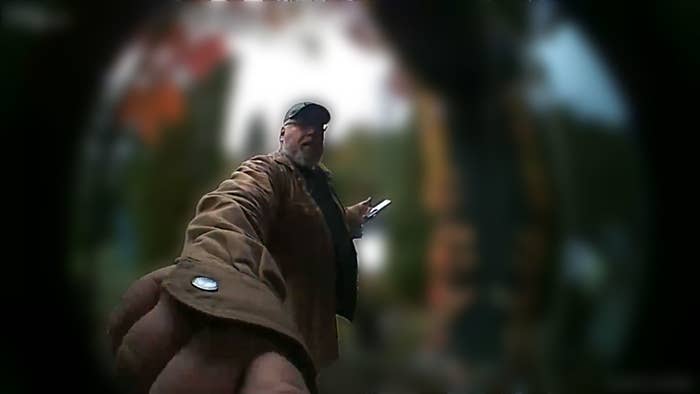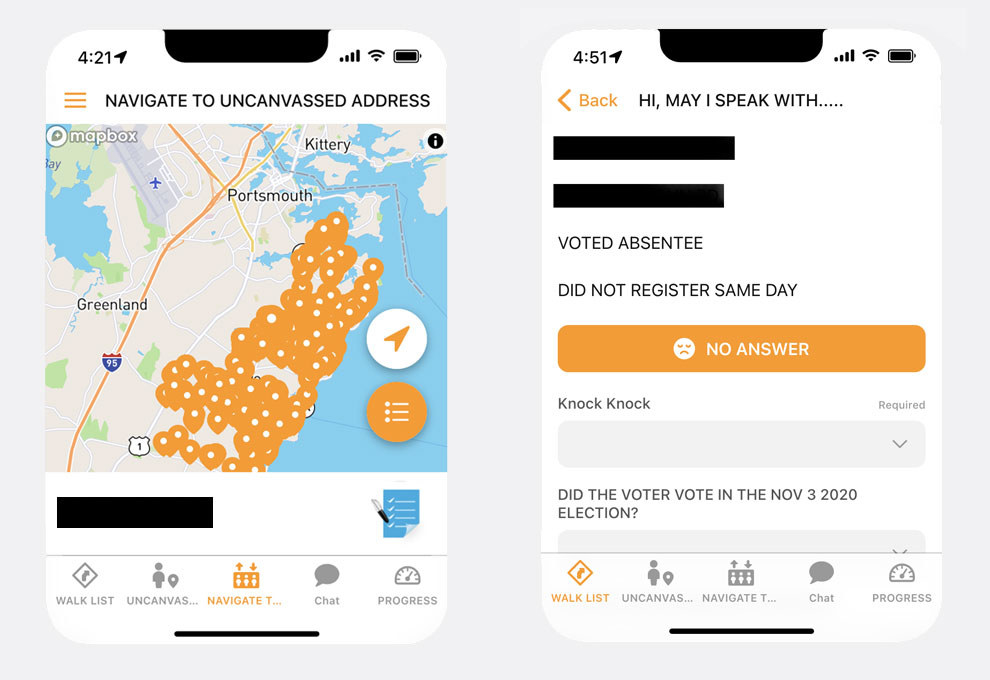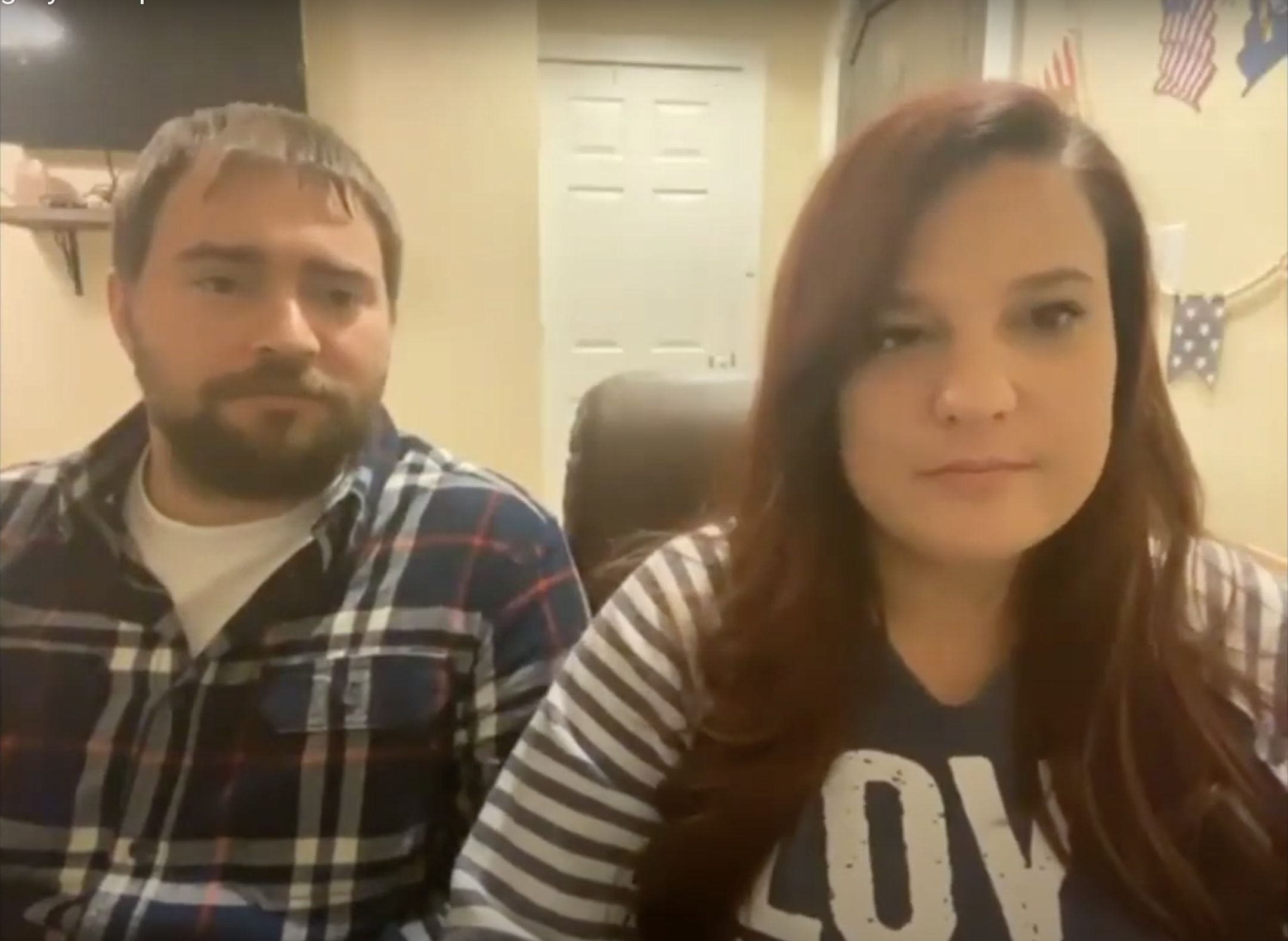The man at the door said he was just there to verify some publicly available information.
In the home security video, he seems nervous and out of breath as he waits at the doorway, glancing frequently at his phone. Strangers don’t knock on doors much in Waterville Valley, New Hampshire, a small ski town. For a decade, it had just 250 year-round residents, until the pandemic hit and a bunch of Massachusetts residents decided to cross state lines and turn their rural vacation spot into a home. But the man at the door wasn’t one of them. He said his name was Dean and he was with the New Hampshire Voter Integrity Group.
The homeowner knew right away something was up, he said later in an interview. He didn’t go to answer the door, but spoke to the man through his Ring camera, pressing him on what exactly the New Hampshire Voter Integrity Group was and who they represented. In the video shared with BuzzFeed News, Dean, haltingly, says they are volunteers. They don’t represent anybody but themselves. They are just trying to verify the town’s voter rolls. The homeowner keeps pressing, and finally Dean gets to the point: “[We] took a look at the election so we’re a little concerned about what happened, so we’re, uh, checking.”
The homeowner, a Democrat, tells him to go to hell and get off his property. “That’ll be a nice trip, thank you,” Dean replies cheerfully in the security footage as he turns to leave. “I’ll see you there.”

Around town that Saturday in early October, other people were knocking on doors — specific ones, the rare ones where people actually live year-round — asking about the 2020 election. They had information on the residents, their names, whether they voted and if they did so in-person or absentee. In response, two Waterville Valley residents called the cops, according to a police report.
Across the country, the pro-Trump conspiracy theory internet is manifesting itself into knocks at the door. Individual election deniers and grassroots groups are canvassing for election fraud in states lost or even won by former president Donald Trump in 2020, including New Hampshire, Arizona, Colorado, Michigan, Pennsylvania, Florida, North Carolina, Utah, and Nebraska. Despite 60-plus court losses and countless official audits and recounts confirming the 2020 election results, many of Trump’s supporters are still so convinced of his lies that they’ve turned to this kind of vigilantism.
It’s all part of a broader effort by Trump supporters — emboldened and given tacit support by Republican Party leaders — to deny the 2020 election results at all costs and cast doubt on elections going forward. When a contractor working on the Arizona Senate’s partisan and farcical “audit” proposed a similar door-knocking scheme last spring, the Justice Department warned that it could violate federal laws on voter intimidation. The Senate backed off, but volunteers did the canvass anyway and put out a sloppy report alleging all kinds of fraud without evidence to back it up. Though reporters quickly debunked their claims — including finding a house on the alleged “vacant” property gracing the report’s cover — the Arizona canvass results went viral on right-wing social media and have inspired copycats.
A member of the far-right Three Percenters militant group is helping lead the canvassing effort in Colorado, where a leader suggested volunteers carrying firearms could help secure the group as they went door-to-door, according to the Colorado Times Recorder. The Utah Voter Verification Project is requiring its volunteer canvassers to sign NDAs before they canvass and has instructed them to record their interactions with voters, according to the Salt Lake Tribune. The sheriff’s office in Buffalo County, Nebraska, posted on Facebook on Nov. 4, warning about similar canvassing efforts and telling voters that the canvassers were not official or affiliated with the county.
The New Hampshire Voter Integrity Group claims to be nonpartisan. Its founder, Marylyn Todd, a 37-year-old from Nashua, told BuzzFeed News in an interview that she is registered as an independent. Todd claimed in a Facebook message that “many” of their canvassers voted for President Joe Biden, but would not name them or connect them with BuzzFeed News. Todd also said that she has expanded canvassing across the state, focusing on towns where the group believes there is the most potential fraud, but she declined to name the towns they’ve visited. The group, she said, “is just trying to get to the bottom of the truth, nothing more, nothing less.”
Members of the group credit Dean, whose last name Todd declined to provide, with creating the app they use to track down voters. (Dean did not respond to questions messaged to his Telegram account nor to questions Todd said she shared with him via email.) The app is designed with a free site that Democrats have used in the past to canvass voters before an election. The app shows canvassers where to find nearby voters, as well as their addresses, whether they voted in 2020, if they voted in person or absentee, and whether they registered to vote same-day. The app asks canvassers to confirm that information and, if they find any discrepancies, to get voters to sign an affidavit and mail it to a P.O. box.

Todd said they are sharing those affidavits with members of the state legislature, “many” of whom are interested in their findings, but declined to provide names. She described affidavits the group collected from two households alleging election misconduct, but declined to share any names or details that could be fact-checked, citing the affiants’ privacy. The Trump campaign used affidavits as part of its failed legal strategy to challenge the 2020 election and held up the sworn statements to try to add some legitimacy to its bogus fraud claims, but, as the Washington Post noted at the time, many of those affidavits were never filed in court and the ones that were filed were often thrown out.
BuzzFeed News was able to access the New Hampshire Voter Integrity Group’s canvassing app using a link they included in a YouTube video. All of the voter information included in the app, along with a voter’s party identification, is public information and can be accessed through a right to know request at the state or local level, New Hampshire Deputy Secretary of State David Scanlan confirmed.
The New Hampshire Voter Integrity Group began its canvassing in Waterville Valley and Rye, a town more than 100 miles southeast of Waterville Valley along the state’s coast. Both cities voted overwhelmingly for Biden and Waterville Valley residents offered a few theories as to why they may have caught election conspiracy theorists’ attention. For one, Waterville Valley’s population has boomed during the pandemic to about double its size. If you were to take a look at turnout there and compare it to previous elections, you’d see a huge spike. For another, the Waterville Valley ski resort is owned by the family of Republican Gov. Chris Sununu — who is often referred to as a “dictator,” a “traitor,” and a “communist” by members of the group. The governor maintains an ownership interest in the family investment group that owns the resort, according to the Associated Press, and he was CEO of the resort before he took office in 2017.
Todd said that Sununu’s ties to the area had nothing to do with the New Hampshire Voter Integrity Group's focus on Waterville Valley; it and Rye were just the “two worst towns in New Hampshire,” according to the group’s analysis of the 2020 election. That analysis, which is posted on its Facebook page, claims that more than 200% of Waterville Valley’s population was registered to vote in 2020. The fine print notes that those figures are based on 2019 Census data — before the town’s population boom. Todd said the figures were actually based on data from New Hampshire Employment Security, a state agency, which also has 2019 population data for the town. Asked about the discrepancy and informed of Waterville Valley’s growth in 2020, Todd emphasized that her group’s reports are “preliminary” and that she would look into the new Census data.
Rye Town Clerk Donna Decotis said her town got “an abundance” of calls from concerned residents when the New Hampshire Voter Integrity Group started knocking on doors there. She advised them of their rights: “They did not have to speak. They do not have to open the door.”
Three Waterville Valley residents who spoke to BuzzFeed News for this story asked that their full names not be used for fear of retribution. It’s a small town. People talk. And a group of conspiracy-minded strangers already turned up at their front doors.
The New Hampshire Voter Integrity Group explicitly tells volunteers not to talk about any political party and never to ask who someone voted for, in part because of the Justice Department’s letter, Todd said, though she disagrees with DOJ’s conclusion. But one Waterville Valley resident said that’s exactly what two people at his doorway asked him — at which point he gave them five seconds to leave. The canvassers did clear out, but the man said he was furious that “two dumbasses” had come calling asking about personal information.
“I was enraged,” he said. “I am to this day offended at the whole notion that there was any widescale election fraud. … I was like, sputtering mad. I called the police dispatch.”
Waterville Valley police determined that no laws had been broken, according to the police report, but the officer told the canvassers that people in a small town like that weren’t used to strangers coming to their doors.
Scanlan, a Republican who pushed back on Trump’s voter fraud claims in 2016, said there’s nothing to prevent citizens from going door-to-door on any kind of survey, absent a local ordinance. Though he was familiar with the New Hampshire Voter Integrity Group from its protests at the state Capitol and local news reports, Scanlan said he personally hadn’t seen any complaints about the group’s canvassing efforts. “From our perspective, it’s part of democracy in New Hampshire and, you know, I have not heard of any activity that is inappropriate or illegal,” he said.
But the Waterville Valley resident who called the police has only gotten angrier as he’s thought about canvassers at his door pushing the same conspiracy theories that led to Jan. 6. The way he sees it, the canvassers aren’t just looking for voter fraud, they’re proselytizing. “Once you start knocking on people’s doors and telling them that you’re part of a volunteer organization trying to hunt out voter fraud, you got to imagine that part of it is they’re looking for disciples.”

Todd rejected the notion that their canvassing efforts might be off-putting to voters, saying that their door knockers are mostly grandparents and they’re respectful. “I would say 99% of the people that we door-knocked are thanking us and they’re super happy that we’re doing this,” she said.
When asked why, then, several people had called the police or the town of Rye and others shared their concerns with BuzzFeed News, Todd stuck to her 99% figure, saying voters wouldn’t be answering their questions if they weren’t happy about it. New Hampshire is just different, she said in a later Facebook message. “We love each other here!!! We respect each other here regardless of politics. We’re above all of that!!!”
Whitney, a Biden voter in Waterville Valley whom BuzzFeed News is referring to by her middle name, said she initially answered the group’s questions when they came to her door because she had no idea what they were talking about. “I didn’t realize until much of the way through our conversation what they were trying to prove,” she said in an interview.
She said it was “a very strange door-knocking” that “just felt stranger as the conversation went on,” but she eventually clocked what they were up to. “I just assumed by the end of the conversation they were looking to prove voter fraud in favor of Trump. Primarily because who else is talking about an election that’s way over?”
All of this started with an actual election issue — hundreds of ballots in a state legislative race in Windham, a town where Todd owns property, that were miscounted in favor of a Democratic candidate. It turned out the problem was the way the ballots were folded, not fraud or malice, and the issue was caught and corrected following a bipartisan audit. But the problems in Windham helped give rise to the audit fever that has swept the far-right, propelled in part by local resident and former Trump 2016 campaign manager Corey Lewandowski.
Todd does not believe the fold explanation and remains extremely bothered by the discrepancy in Windham. Her quest to find the real fraud there has snowballed into a self-described crusade. Her group is pushing for a statewide audit and canvass, conducted by Todd and her cadre of internet volunteers themselves if need be. They’ve grown to more than 5,000 members on a private Facebook page that is littered with misinformation, anti-vaccine sentiments, and QAnon slogans. (Todd said she’s asked her moderators to block vaccine and Q-related content; she said she was not familiar with the “WWG1WGA” QAnon slogan littering the comments on the page and thought it was related to “What Would Jesus Do.”)
Todd is new to all of this. She said she didn’t even know what a state representative was before February and that she “barely voted” before this year, but she now leads a group that has acquired the voting machine tapes and voter information for nearly every town in the state by filing a bunch of public information requests and going in-person to get their data. Todd is clearly passionate and believes her work as an auditor for an accounting firm gave her the experience to do her own audit of New Hampshire’s election. She took a leave of absence from that job in February to focus on what she calls their citizens audit. “Did I know that I was still going to be here almost a year later on a leave of absence?” she said, laughing. “No. But, you know, auditing a whole state isn’t as easy as I originally thought it was.”
In just Waterville Valley and Rye, Todd claimed in a Facebook video that they’ve found “a little over 15% of phantom voters,” which she defines as “people that didn’t vote and that all of sudden there’s an absentee ballot cast in their name.”
The Waterville Valley homeowner who told Dean to go to hell was particularly surprised that the group chose his town to canvass because it’s so small and because it uses paper ballots in its elections. He used to volunteer as a vote tabulator for Waterville Valley and told BuzzFeed News that voters mark their ballots with pencil and tabulators count them by hand. “It’s not like there’s any kind of tampering going on because there’s too many people around,” he said. “So I know what the election process is here in this little town, and for somebody to come here and say that there was inconsistencies with the election, I just thought was ridiculous.”
Likewise, Decotis, the town clerk in Rye, was taken aback when the New Hampshire Voter Integrity Group suggested there was voter fraud in her town. Decotis has helped out with Rye’s elections for years. “Like I said to them, we run a good election here,” she said. “Our numbers always match.”
The New Hampshire Voter Integrity Group is still canvassing around Rye and other cities in the state. The group claims to have raised just under $75,000 this year and plans to spend $30,000 to produce a documentary about “election corruption” in New Hampshire.
Todd told BuzzFeed News she was just crossing T's on a new app where anyone can check 2020 voting data for themselves and their neighbors, making sure that it is identical to the public information they got from their right-to-know requests. “You know, my life has already been affected so much from this that I just don't want it affected any more than it already is,” she said.
She said she has not enjoyed her first foray into politics, repeatedly calling it “dirty” and “gross.” But almost a year after she started all of this, Todd plans to keep going. “It’s important for me to keep America, America. And when I saw this much opportunity [for fraud], it made me nervous for the future generations,” she said.
If politics were less dirty, “if people were ethical,” she said, “I’d probably run for something.” ●
Correction: The sheriff’s office in Buffalo County, Nebraska, warned residents about canvassers. A previous version of this story misidentified the state.
